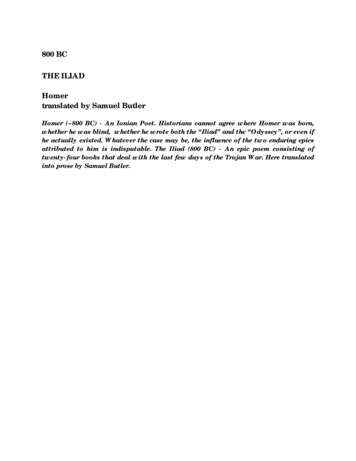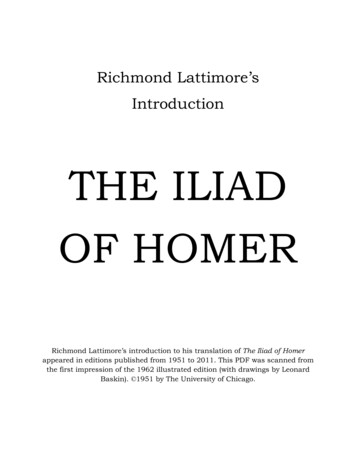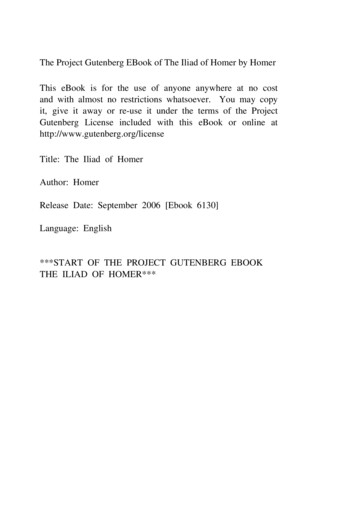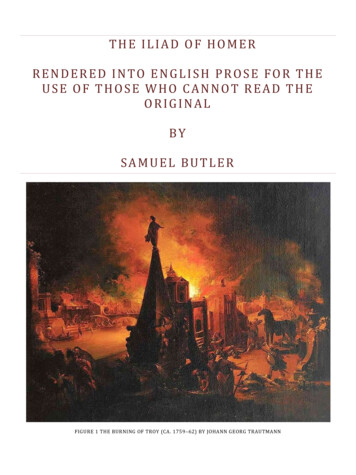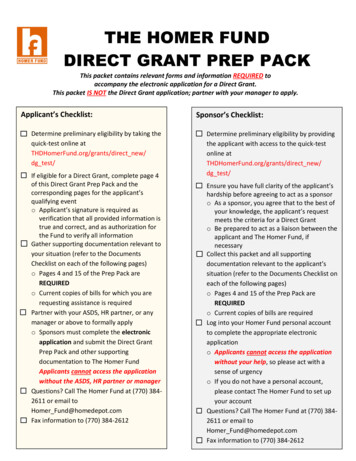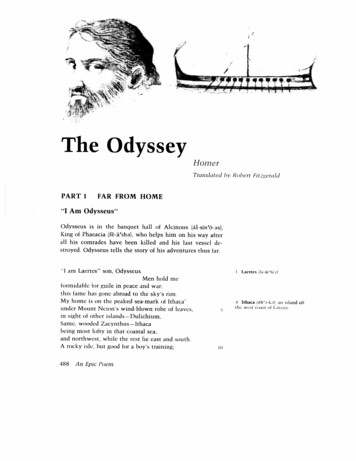
Transcription
IThe OdysseyHomerTranslated lv Robert Fitzç’eraldPART 1FAR FROM HOME“I Am Odysseus”Odysseus is in the banquet hail of Alcinous (l-sin’o-s,King of Phaeacia (fë-a’sha), who helps him on his way afterall his comrades have been killed and his last vessel destroyed. Odysseus tells the story of his adventures thus far.‘I am Laertes’ son, Odysseus.Men hold meformidable for guile in peace and war:this fame has gone abroad to the sky’s rim.My home is on the peaked sea-mark of Ithacaunder Mount Neion’s wind-blown robe of leaves,in sight of other islands—Dulichium,Same, wooded Zacynthus—Ithacabeing most lofty in that coastal sea,and northwest, while the rest lie east and south.A rocky isle, but good for a boy’s training;488An Epic Poem[aertes Ia4 Ithaca ith’. k) ,in island oftit C reece.the west e astI (I
I shall not see on earth a place more dear,though I have been detained long by Calypso,’loveliest among goddesses, who held mein her smooth caves, to be her heart’s delight,as Circe of Aeaea, the enchantress,15desired me, and detained me in her hail.But in my heart I never gave consent.Where shall a man find sweetness to surpasshis OWfl home and his parents? In far landshe shall not, though he find a house of gold.20What of my sailing, then, from Troy?What of those yearsof rough adventure, weathered under Zeus?The wind that carried west from Ilionbrought me to Ismarus, on the far shore,a strongpoint on the coast of the Cicones.25I stormed that place and killed the men who fought.[under we took, and we enslaved the women,to make division, equal shares to all—hut on the spot I told them: ‘Back, and quickly!Out to sea again!’ My men were mutinous,30tools, on stores of wine. Sheep after sheepthey butchered by the surf, and shambling cattle,teasting—while fugitives went inland, runningto call to arms the main force of Cicones.This was an army, trained to fight on horseback35or, where the ground required, on foot. They camewith dawn over that terrain like the leavesmd blades of spring. So doom appeared to us,dark word of Zeus for us, our evil days.My men stood up and made a fight of it—40hacked on the ships, with lances kept in play,I rom bright morning through the blaze of noonholding our beach, although so far outnumbered;hut when the sun passed toward unyoking time,then the Achaeans, one by one, gave way.45Six benches were left empty in every shiphat evening when we pulled away from death.\nd this new grief we bore with us to sea:or precious lives we had, but not our friends.No ship made sail next day until some shipmatesotad raised a cry, three times, for each poor ghostinfleshed by the Cicones on that field.12. Calypso k1ip’sö).15. Circe (sür’së) of Aeaea e’e-).22. Zeus jzs): king of the gods.2,3. Ilion fl’ë-Onl: Troy.25. Cicones si-kö’nëz).45. Achaeans -k’nz): GreeksOdysseus’ men).The Odyssey489
The Lotus-EatersNow Zeus the lord of cloud roused in the northa storm against the ships, and driving veilsof squall moved down like night on land and sea.The bows went plunging at the gust; sailscracked and lashed out strips in the big wind.We saw death in that fury, dropped the yards,unshipped the oars, and pulled for the nearest lee:then two long days and nights we lay offshoreworn out and sick at heart, tasting our grief,until a third Dawn came with ringlets shining.Then we put up our masts, hauled sail, and rested,letting the steersmen and the breeze take over.I might have made it safely home, that time,hut as I came round Malea the currenttook me out to sea, and from the northa fresh gale drove me on, past Cythera.I490An Epic Poemlee: pIft.c sheltered from thessind-
/Nine days I drifted on the teeming seabefore dangerous high winds. Upon the tenthwe came to the coastline of the Lotus-Eaters,who live upon that flower. We landed thereto take on water. All ships’ companiesmustered alongside for the midday meal.Then I sent out two picked men and a runnerto learn what race of men that land sustained.They fell in, soon enough, with Lotus-Eaters,who showed no will to do us harm, onlyoffering the sweet Lotus to our friends—hut those who ate this honeyed plant, the Lotus,never cared to report, nor to return:they longed to stay forever, browsing onthat native bloom, forgetful of their homeland.I drove them, all three wailing, to the ships,tied them down under their rowing benches,and called the rest: ‘All hands aboard;come, clear the beach and no one tastethe Lotus, or you lose your hope of home.’Filing in to their places by the rowlocksmy oarsmen dipped their long oars in the surf,and we moved out again on our seafaring.7075so90/f/*IThe Odyssey 491
IThe CyclopsIn the next land we found were Cyclopes, giants, louts, without a law to bless them,In ignorance leaving the fruitage of the earth in mysteryto the immortal gods, they neither plownor sow by hand, nor till the ground, though grain—wild wheat and harley—grows untended, andwine grapes, in clusters, ripen in heaven’s rain.Cyclopes have no muster and no meeting,no consultation or old tribal ways,but each one dwells in his own mountain cavedealing out rough justice to wife and child,indifferent to what the others do.As we rowed on, and nearer to the mainland,at one end of the hay, we saw a cavernyawning above the water, screened with laurel,and many rams and goats about the placeinside a sheepfold—made from slabs of stoneearthfast between tall trunks of pine and ruggedtowering oak trees.A prodigious’ manslept in this cave alone, and took his flocksto graze afield—remote from all companions,knowing none but savage ways, a bruteso huge, he seemed no man at all of thosewho eat good wheaten bread; but he seemed rathera shaggy mountain reared in solitude.We beached there, and I told the crewto stand by and keep watch over the ship;as tor myself I took my twelve best fightersand went ahead. I had a goatskin fullof that sweet liquor that Euanthes’ son,Maron, had given me. He kept Apollo’sholy grove at Ismarus; for kindnesswe showed him there, and showed his wife and child,he gave me seven shining golden talents perfectly formed, a solid silver winebowl,and then this liquor—twelve two-handled jarsof brandy, pure and fiery. Not a slavein Maron’s household knew this drink; onlyhe, his wife and the storeroom mistress knew;492An Epic Poem92. Cyclopes si-klö’pzI. pluralform of Cyclops sI’-klOps), a raceof one eyed (,iants.95100105110110. prodigious lpra-dij’.s. gigantic.115120122. Apollo -pOl’): god of musicprophecy, and medicine.125125. talent: a unit of money in ancient Greece.
and they would put one cupful—ruby-colored,honey-smooth—in twenty more of water,hut still the sweet scent hovered like a fume ver the winebowl. No man turned awaywhen cups of this came round.A wineskin fullI brought along, and victuals in a bag,br in my bones I knew some towering brutewould be upon us soon—all outward power,a wild man, ignorant of civility.We climbed, then, briskly to the cave. But Cyclopshad gone afield, to pasture his fat sheep,so we looked round at everything inside:a drying rack that sagged with cheeses, pensurowded with lambs and kids, each in its class:birstlings apart from middlings, and the ‘dewdrops,’ur newborn lambkins, penned apart from both.And vessels full of whey were brimming there—howls of earthenware and pails for milking.\4y men came pressing round me, pleading:‘Why nottake these cheeses, get them stowed, come hack,throw open all the pens, and make a run for it?We’ll drive the kids and lambs aboard, We sayput out again on good salt water!’Ah,how sound that was! Yet I refused. I wishedto see the cave man, what he had to offer—no pretty sight, it turned out, for my friends.We lit a fire, burnt an offering,and took some cheese to eat; then sat in silencearound the embers, waiting. When he camehe had a load of dry boughs on his shoulderto stoke his fire at suppertime. He dumped itwith a great crash into that hollow cave,nd we all scattered fast to the far wall.then over the broad cavern floor he usheredhe ewes he meant to milk. He left his ramsmd he-goats in the yard outside, and swunghigh overhead a slab of solid rockto close the cave. Two dozen four-wheeled wagons,1351401451.50155160The Odyssey 493
with heaving wagon teams, could not have stirredthe tonnage of that rock from where he wedged itover the doorsill. Next he took his seatand milked his bleating ewes. A practiced lobhe made of it, giving each ewe her suckling;thickened his milk, then, into curds and whey,sieved out the curds to drip in withy baskets,and poured the whey to stand in howlscooling until he drank it for his supper.When all these chores were done, he poked the fire,heaping on brushwood. In the glare he saw us.Strangers,’ he said, ‘who are you? And where fromWhat brings you here by seaways— a fair traffic?Or are you wandering rogues, who cast your yeslike dice, and ravage other folk by sea?’We felt pressure on our hearts, in dreadof that deep rum ble and that iii ightv manBut all the same I spoke UI) II] reply:.494An Epic 1171)7SI 7’ withy with’e): midi itslcnilcr twigs
We are from Troy, Achaeans, blown off coursey shifting gales on the Great South Sea;omeward bound, but taking routes and waysincommon; so the will of Zeus would have it.Ve served under Agamemnon, son of Atreus—‘he whole world knows what cityie laid waste, what armies he destroyed.t was our luck to come here; here we stand,)eholden for your help, or any giftsou give as custom is to honor strangers.Ve would entreat you, great Sir, have a carei)r the gods’ courtesy; Zeus will avengehe unoffending guest.’Fle answered thisom his brute chest, unmoved:‘You are a ninny,Jr else you come from the other end of nowhere,oiling me, mind the gods! We Cyclopesare not a whistle for your thundering ZeusJr all the gods in bliss; we have more force by farwould not let you go for fear of Zeuson or your friends unless I had a whim to.[eli me, where was it, now, you left your shipiround the pot n t, or down the shore, I wDnder?’1909Agamemnong’-mem’non’Creek king who led the Creek’,,igjinst the 1 roJans.
IHe thought he’d find out but I saw through this,and answered with a ready lie:‘My ship?Poseidon Lord, who sets the earth a-tremble,broke it up on the rocks at your land’s end.A wind from seaward served him, drove us there.We are survivors, these good men and 1.’Neither reply nor pity came from him,but in one stride he clutched at my companionsand caught two in his hands like squirming puppiesto beat their brains out, spattering the floor.Then he dismembered them and made his meal,gaping and crunching like a mountain lion—everything: innards, flesh, and marrowbones.We cried aloud, lifting our hands to Zeus,powerless, looking on at this, appalled;but Cyclops went on filling up his bellywith manflesh and great gulps of whey.then lay down like a mast among his sheep.My heart beat high now at the chance of action,and drawing the sharp sword from my hip I wentalong his flank to stab him where the midnifholds the liver. I had touched the spotwhen sudden fear stayed me: if 1 killed himwe penshed there as well, for we could nevermove his ponderous doorway slab aside.So we were left to groan and wait for morning.When the young Dawn with fingertips of roselit up the world, the Cyclops built a fireand milked his handsome ewes, all in due order,putting the sucklmgs to the mothers. Then.his chores being all dispatched, he caughtanother brace of men to make his breakfast,and whisked away his great door slabto let his sheep go through—but he, behind.reset the stone as one would cap a quiver.There was a din of whistling as the Cyclopsrounded his flock to higher ground, then stillness.And now I pondered how to hurt him worst.if but Athena granted what I prayed for.Here are the means I thought would serve my turn:110mid ‘1Fwida pO-si’dan)hCJ and at carthquaknill.theitsno11%244).iaiø240 bract pair14%147Aihas a-the’naF grnldcus ofwisdom.496 An Epic Poemi
A club, or staff, lay there along the fold—an olive tree, felled green and left to seasonbr Cyclops’ hand. And it was like a masta lugger of twenty oars, broad in the beama deep-sea-going craft—might carry:so long, SO big around, it seemed. Now Ichopped out a six-foot section of this poleand set it down before my men, who scraped it;and when they had it smooth, I hewed againto make a stake with pointed end. I held thisin the fire’s heart and turned it, toughening it,then hid it, well back in the cavern, underone of the dung piles in profusion there.Now came the time to toss for it: who venturedalong with me? whose hand could bear to thrustand grind that spike in Cyclops’ eye, when mildsleep had mastered him? As luck would have it,the men I would have chosen won the toss—four strong men, and I made five as captain.—At evening came the shepherd with his flock,his woolly flock. The rams as well, this time,entered the cave: by some sheepherding whim—or a god’s bidding—none were left outside.Re hefted his great boulder into placeand sat him down to milk the bleating ewesin proper order, put the lambs to suck,and swiftly ran through all his evening chores.Then he caught two more men and feasted on them.My moment was at hand, and I went forwardholding an ivy howl of my dark drink,looking up, saying:‘Cyclops, try some wine.Here’s liquor to wash down your scraps of men.Taste it, and see the king of drink we carriedunder our planks. I meant it for an offeringif you would help us home. But you are mad,unbearable, a bloody monster! After this,will any other traveler come to see you?’25526026,5270275280285F-fe seized and drained the howl, and it went downso fiery and smooth he called for more:The Odyssey497
‘Give me another, thank you kindly. Tell me,how are OU called? I’ll make a gift will please you.Even Cyclopes know the wine grapes growout of grassland and loam in heaven’s rain,but here’s a hit of nectar and amhrosia!’Three howls I brought him, and he poured them down.I saw the fuddle and flush come over him,then I sang out in cordial tones:‘Cyclops,you ask my honorable name? Rememberthe gift you promised me, and I shall tell you.My name is Nohbdy: mother, hither, and friends,everyone calls me Nohhdy.’And he said:‘Nohhdy’s my meat, then, after I eat his friends.Others come firSt. There’s a noble gift, flow.’A”,‘92. nectar and ambrosia ambi’zha): drink and fo)d of thc1yn godS
yen as he spoke, he reeled and tumbled backward,is great head lolling to one side; and sleep.ek him like any creature. Drunk, hiccuping,ic dribbled streams of liquor and bits of men.iow, by the gods, I drove my big hand spikeeep in the embers, charring it again,ad cheered my men along with battle talkkeep their eouiage up: no quitting now.I he pike of olive, green though it had been,‘ddened and glowed as if about to catch.drew it from the coals and my four fellowsave me a hand. lugging it near the Cyclopss more than natural force nerved them; straightirwaid they sprinted, lifted it, and rammed itseep in his crater eve, and I leaned on iturning it as a shipwright turns a dnlli planking, having men below to swingne two handled strap that spins it in the groove.o with our brand we bored that great eye sockethile blood ran out around the red hot bar.velid and lash were seared; the pierced ballussed broiling, and the roots poppedIn a smithysees a white hot axhead or an adzlunged and wrung in a cold tub, screeching steamhe way they make soft iron hale and hard:1st so that eyeball hissed around the spike.he Cyclops bellowed and the iock toared round him,1id we tell back in fear. Clawing his facee tugged the bloody spike out of his eye.nrew it away, and his wild hands went groping;nen he set up a howl for Cyclopesvho lived in caves on windy peaks nearbysome heard him; and they came by divers wayso clump around outside and call:‘What ails you,olyphemus? Why do you cry so soreii the starry night? You will not let us sleep.uw no man’s driving oft your flock? No manas tricked you, ruined you?’Out of the cavePolyphemusmammothroaredin answerie4thnoliinous dines di% .na’1v.rnuuilbHo Pelyphema ip ’.’1rc’m4The odyssey 499
‘Nohbdy, Nohhdy’s tricked me, Nohbdy’s ruined me!’To this rough shout they made a sage reply:‘Ah well, if nobody has played you foulthere in your lonely bed, we are no use in paingiven by great Zeus. Let it he your father,Poseidon Lord, to whom you pray.’So sayingthey trailed away. And I was filled with laughterto see how like a charm the name deceived them.Now Cyclops, wheezing as the pain came on him,fumbled to wrench away the great doorstoneand squatted in the breach with arms thrown widefor any silly beast or man who bolted—hoping somehow I might he such a fool.But I kept thinking how to win the game:death sat there huge; how could we slip away?I drew on all my wits, and ran through tactics,reasoning as a man will for dear life,until a trick came— and it pleased me well.The Cyclops’ rams were handsome, fat, with heavyfleeces, a dark violet.Three abreastI tied them silently together, twiningcords of willow from the ogre’s bed;then slung a man under each middle oneto ride there safely, shielded left and right.So three sheep could convey each man. I tookthe woolliest ram, the choicest of the flock,and hung myself under his kinky belly,pulled up tight, with lingers twisted deepin sheepskin ringlets for an iron grip.So, breathing hard, we waited until morning.When [)awn spread out her fingertips of rosethe rams began to stir, moving for pasture,and peals of bleating echoed round the penswhere dams with udders full called for a milking.Blinded, and sick with pain from his head wound,the master stroked each ram, then let it pass,hut my men riding on the pectoral fleecethe giant’s blind hands blundering never found.50()An Epic Poem.165.77, pectoral pëk’trI: un thechest.
Last of them all my ram, the leader, came,weighted by wool and me with my meditations.The Cyclops patted him, and then he said:Sweet cousin ram, why lag behind the restin the night cave? You never linger so,hut graze before them all, and go afarto crop sweet grass, and take your stately wayleading along the streams. until at eveningyou run to he the first one in the fold.Why, now, so far behind? Can you be grievinguver your Master’s eye? That carrion rogueand his accurst companions burnt it outwhen he had conquered all my wits with wine.Nohbdy will not get out alive, I swear.Oh, had you brain and voice to tellwhere he may he now, dodging all my fury!Bashed by this hand and bashed on this rock wallhis brains would strew the floor, and I should haverest from the outrage Nohbdy worked upon me,’.390K9. carrion kãr’ë-n) rogue: rotten scoundrel.
He sent us into the open, then. Close by,I dropped and rolled clear of the ram’s belly,going this way and that to untie the men.400With many glances back, we rounded uphis fat, stiff-legged sheep to take aboard,and drove them down to where the good ship lay.We saw, as we came near, our fellows’ facesshining; then we saw them turn to grief405tallying those who had not fled from death.I hushed them, jerking head and eyebrows up,and in a low voice told them: ‘Load this herd;move fast, and put the ship’s head toward the breakers.’They all pitched in at loading, then embarked.noand struck their oars into the sea. Far out,as far offshore as shouted words would carry,I sent a few back to the adversary:‘0 Cyclops! Would you feast on my companions?Puny, am 1. in a cave man’s hands?How do you like the beating that we gave you,you damned cannibal? Eater of guestsunder your roof! Zeus and the gods have paid you!’The blind thing in his doubled fury brokea hilltop in his hands and heaved it after us.Ahead of our black prow it struck and sankwhelmed in a spuming geyser, a giant wavethat washed the ship stern foremost hack to shore.I got the longest boathook out and stoodfending us off, with furious nods to allto put their backs into a racing stroke—row, row, or perish. So the long oars bentkicking the foam stemward, making headuntil we drew away, and twice as far.Now when I cupped my hands I heard the crewin low voices protesting:‘Godsake, Captain!Why bait the beast again? Let him alone!’‘That tidal wave he made on the first throwall but beached us.’‘All but stove us in!’502An Epic Poem415420
‘Give him our bearing with your trumpeting,he’ll get the range and lob a boulder.’‘Aye!He’ll smash our timbers and our heads together!’I would not heed them in my glorying spirit,but let my anger flare and yelled:‘Cyclops,if ever mortal man inquirehow you were put to shame and blinded, tell himOdysseus, raider of cities, took your eye:Laertes’ son, whose home’s on Ithaca!’4’5440At this he gave a mighty sob and rumbled:‘Now comes the weird upon me, spoken of old.A wizard, grand and wondrous, lived here—Telemus,a son of Eurymus; great length of dayshe had in wizardry among the Cyclopes,and these things he foretold for time to come:my great eye lost, and at Odysseus’ hands,Always I had in mind some giant, armedin giant force, would come against me here.but this, but you small, pitiful and twiggyyou put me down with wine, you blinded me.Come back, Odysseus, and I’ll treat you well,praying the god of earthquake to befriend youhis son I am, for he by his avowalfathered me, and, if he will, he mayheal me of this black wound—he and no otherof all the happy gods or mortal men.’—445445. weird: fate or destiny450—455456. god of earthquake: Poseidon.—460Few words I shouted in reply to him:‘If I could take your life I would and takeyour time away, and hurl you down to hell!The god of earthquake could not heal you there!’At this he stretched his hands out in his darknesstoward the sky of stars, and prayed Poseidon:465‘0 hear me, lord, blue girdler of the islands,if I am thine indeed, and thou art father:The Odyssey 503
grant that Odysseus, raider of cities, neversee his home: Laertcs’ son, I mean,who kept his hail on Ithaca, Should destinyintend that he shall see his roof againamong his family in his fatherland,far he that day, and dark the years between.Let him lose all companions, and returnunder strange sail to hitter days at home.’In these words he prayed, and the god heard him.Now he laid hands upon a bigger stoneand wheeled around, titanic for the cast,to let it fly in the hlackprowed vessel’s track.But it tell short, Just aft the steering oar,and whelming seas rose giant above the stoneto bear us onward toward the island.Thereas we ran in we saw the squadron waiting,the trim ships drawn up side by side, and allour troubled friends who waited, looking seaward.We beached her, grinding keel in the soft sand,and waded in, ourselves, on the sandy beach.Then we unloaded all the Cyclops’ flockto make division, share and share alike,only my fighters voted that my ram.the prize of all, should go to mc. I slew himby the seaside and burnt his long thighhonesto Zeus beyond the stormcloud, Cronus’ son,who rules the world. But Zeus disdained my offering:destruction for my ships he had in storeand death for those who sailed them, my companions.Now all day long until the sun went downwe made our feast on mutton and sweetwine,till after sunset in the gathering darkwe went to sleep above the wash of ripples.When the young Dawn with fingertips (if rosetouched the world, I roused the men, gave ordersto man the ships, cast off the mooring lines;and tiling in to sit beside the rowlocksoarsmen in line dipped oars in thegray sea.So we moved out, sad in the vast offing,having our precious lives, but not our friends.504An Epic �I.,,
FOR STUDY AND DISCUSSIONQI. Odysseus begins his narrative when he andhis men set sail from Troy. What does the episode of the Cicones reveal about Odysseusand his men?2. Almost all of the adventures in the Ody.ssev illustrate some aspect of Odysseus’ character. What specific characteristics are revealed in the episode of the Lotus-Eaters?3. The land of the Lotus-Eaters has been saidto symbolize escapi.rn that is, withdrawalfri m reality into a dream world. 1)o y( inagree? If you do, point out lines that suppi rtyour view. If you do not, give reasons for youropinion.4. Why does Odysseus consider the (yclopesbarbarians?5. 1—lospitality to strangers is a theme thatrecurs throughout the ()dv,s’L’v. The ancientGreeks believed that the gods themselvessometimes came to earth disguised as humblestrangers. How does the Cyclops respond toOdysseus’ plea for hospitality?6. Twice in the Cyclops episode Odysseusbrings misfortune upon himself and his menby ignoring their good advice Identify bothinstances and tell why Odysseus acts as hedoes.7. Odysseus devises a plan that enables himand his men to escape from the Cyclops caveand to prevent anyone coming to the Cyclops’aid. What is each stage of the plan?8. What aspects of Odysseus’ character arerevealed in the incident with the Cyclops?9. Reread the Cyclops’ prayer to Poseidon(lines 467 476 What lines suggest that Odysseus will have to face other trials? How doesthis foreshadowing add to the suspense of thepoem?—The (hi vssev5P5
The SirensOdysseus and his crew arrive next at the island of Aeolus(‘a-las), god of the winds, who helps them homeward bybottling up unfavorable winds and sending them a fair breeze.After nine days’ sail, with Ithaca in sight, the men untie thebag of winds, and their ships are blown straight back toAeolus’ island. Realizing that their voyage is cursed by thegods, Aeolus drives them away.In the land of the Laestrygonians (ls’tri-gö’në.anz), arace of cannibals, all the ships hut one are destroyed and theircrews devoured. Odysseus’ own ship escapes and proceeds tothe island of Aeaea, where the goddess Circe transformsOdysseus’ men into swine. After Circe releases his men fromthe spell, Odysseus spends a year with her. He longs, however, to return to Ithaca. Odysseus sails to the land of thedead, where the ghost of the blind prophet Tiresias (tTr’ss) tells him what he must do to reach home. Before settingsail for Ithaca, Odysseus returns briefly to Circe’s island. Shewarns him of the dangers that lie ahead, and Odysseus tellshis men what Circe has predicted.As Circe spoke, Dawn mounted her golden throne,and on the first rays Circe left me, takingher way like a great goddess up the island.I made straight for the ship. roused up the mento get aboard and cast off at the stern.They scrambled to their places by the rowlocksand all in line dipped oars in the gray sea.But soon an offshore breeze blew to our liking—a canvasbe1lying breeze, a lusty shipmatesent by the singing nymph with sunhright hair.So we made fast the braces, and we rested,letting the wind and steersman work the ship.The crew being now silent before me, Iaddressed them, sore at heart:‘Dear friends,more than one man, or two, should know those thingsCirce foresaw for us and shared with me,so let me tell her forecast: then we diewith our eyes open,. if we are going to die,or know what death we baffle if we can. Sirensweaving a haunting song over the sea506An Epic PoeminIsnymph.hair: Cir’
we are to shun, she said, and their green shoreall sweet with clover; yet she urged that Ialone should listen to their song. Thereforeyou are to tie me up, tight as a splint,rect along the mast, lashed to the mast,and if I shout and beg to be untied,take more turns of the rope to muffle me.’I rather dwelt on this part of the forecastwhile our good ship made time, bound outward downthe wind for the strange island of Sirens.rhen all at once the wind fell, and a calmarne over all the sea, as though some powerlulled the swell.The crew were on their feetbriskly, to furl the sail, and stow it; then.each in place, they poised the smooth oar blades.ind sent the white foam scudding by. I carveda massive cake of beeswax into bitsand rolled them in my hands until they softened—no long task, for a burning heat came downrom Helios: lord of high noon. Coing forward1I carried wax along the line, and laid itthick on their ears. They tied me up, then, plumbamidships, back to the mast, lashed to the mast,md took themselves again to rowing. Soon,as we came smartly within hailing distance,the two Sirens, noting our fast shipff their point. made ready, and they sang:S4U545. Helios h’Ië-OsTh thesun god‘This way, oh turn your bows,Achaea’s glory,As all the world allows—Moor and be merry.Sweet coupled airs we sing.No lonely seafarerHolds clear of enteringOur green mirror.Pleased by each purling noteLike honey twining565From her throat and my throat,Who lies a-pining?The Odyssey507
Sea rovers here take joyVoyaging onward,As from our song of TroyGraybeard and rower-boyCoeth more learned.All feats on that great fieldIn the long warfare,Dark days the bright gods willed,Wounds you bore there,Argos’ old soldieryOn Troy beach teeming,Charmed out of time we see.No life on earth can beHid from our dreaming.’ç.57577 Argus’ old soldiery: the%oldlcrs tron Argos, a city in ancient (,reece, who mnught in theTroian War
The lovely voices in ardor appealing over the watermade me crave to listen, and I tried to sayUntie me’ to the crew, jerking my brows;hut they bent steady to the oars. Then Perimedes got to his feet, he and Eurylochus, and passed more line about, to hold me still.So all rowed on, until the Sirensdropped under the sea rim, and their singingdwindled away.My faithful companyrested on their oars now, peeling offthe wax that I had laid thick on their ears;then set me free.85. Perimedes pêr’-rne’dèzi.586. Eurylochus y-riI’-ksI.1f”,-.a/The Odvsey 509
Scylla and CharybdisCirce has warned Odysseus ot another sea peril. He and hiscrew must pass between Scylla sil’) and Charybdis(ko-rIh’dis). Scylla is a terrifying monster with six heads.She dwells in a high rocky cave, devouring sailors in shipsthat pass close by. Charybdis is a whirlpool. Three times aday she swallows the sea, then vomits it up fiery hot. Circehas advised Odysseus to sail toward Scylla’s crag, for it is better to lose six of his men one to e
The Lotus-Eaters Now Zeus the lord of cloud roused in the north a storm against the ships, and driving veils of squall moved down like night on land and sea. The bows went plunging at the gust; sails cracked and lashed out strips in the big wind. We saw death in that fury, dropped the yards, unshipped theoars, and pulled for nearest lee: then two long days and nights we lay offshore
